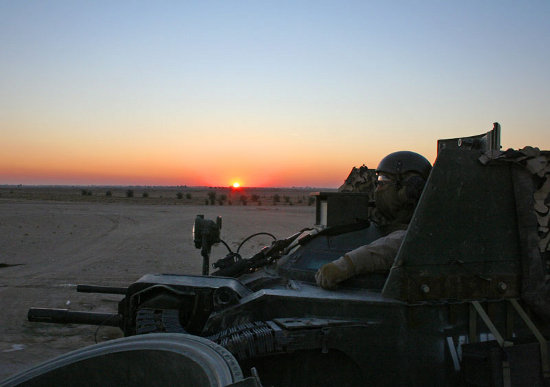|
|
|
Marine Staff Sergeant Niceforo “Joker” Mendoza leads a section of Amtraks on an IED hunt/route clearance mission between Abu Ghraib and Habbaniyah in January 2007. Photo by Bill Ardolino. |
A heartening Op-Ed by James Soriano in The New York Times proclaims “Mission Accomplished in Anbar,” marking “the formal end of the presence of U.S. Marine ground combat units” in the province. To appreciate the extent of this accomplishment, Soriano strolls down memory lane:
At that time, Anbar Province was in an Al Qaeda death grip. Insurgents roamed Ramadi’s streets at will. They kidnapped and murdered prominent citizens. The mosques were under the control of radicals.
The Marines were sent to tame Anbar in 2004. They were the “strongest tribe,” and along with American soldiers, sailors and airmen they were locked in grim urban fighting in cities like Ramadi and Fallujah. The toll was high: Over 30 percent of American war fatalities have been sustained in Anbar Province.
Soriano then highlights the commonly understood factors that enabled the remarkable turn-around: the population began to hate Al Qaeda in Iraq, the police came into their own, the tribes were successfully engaged, and “combined US-Iraqi military operations were effective.”
I can’t help but feel a sense of satisfaction and admiration for the Marines, sailors and soldiers I’ve met who worked so hard to get to this point. My first visit to Anbar in January 2007 was an eye-opening experience. Though Fallujah was sometimes publicized as a model example of US efforts, the city was a violent mess as US and Iraqi forces were beset by multiple daily attacks. Iraqi and US personnel were dying at a steady rate. Habbaniyah was still insecure, Karma was a viper’s nest. The tail end of the bloody battle of Ramadi still gasped in the provincial capital. The Iraqi Army was underresourced and often unwelcome in the Sunni province, and the police were intimidated. And perhaps most disheartening from a strategic perspective, AQI’s murder and intimidation campaign had paralyzed economic and political development, and insurgents actually funded themselves by extorting money from American contracts intended to better the province.
But there were glimmers of hope in the eastwardly spreading tribal Awakening, an increase in police recruitment, and the placement of competent American and Iraqi leaders in key positions. At the end of a month in the Fallujah area, I hedgingly wrote:
[T]he countless assessments from Americans and Iraqis who told me Fallujah would dissolve into blood-soaked anarchy if the US precipitously withdraws … spurred rigorous examination of the conflict’s worth and workability. And in the end I think it’s both worth it and workable, if we define realistic endpoints and muster requisite political will. To be clear, these are big “ifs.”
Little could I imagine that barely eight months later, I’d hear one lone gunshot over two weeks during my second visit. Or that I would watch Marines and formerly intimidated Iraqi Police hand out food bags in broad daylight, walking with the insouciant confidence that came with owning the city. Or that I would listen to Civil Affairs Marines complain about the boredom of their deployment while pining to “get some.” Or that I would read of Michael Totten’s concurrently peaceful visit to a ruined but rebuilding Ramadi.
And two years after that September, the Sunni Iraqi Police in Anbar continue to be resourced by the “Shia” central Iraqi government in Baghdad, and the broad swath of Sunni society has jumped back into the political process with both feet. Provincial elections were a success and Anbar political parties are currently wheeling and dealing with ethno-sectarian coalitions across Iraq as they jockey for position prior to national elections in 2010.
Anbar is not completely stable and secure. As with other parts of Iraq, occasional bombs, assassination attempts, corruption and malignant bids to fix elections mark the economic and political competition that stalks the province’s attempt to establish stable governance and democracy. It still remains to be seen how well the feudal and inherently elitist tribal system will mesh with elections and civil institutions. Jeffersonian Democracy remains an unlikely dream, though something more akin to classically corrupt Chicago politics in the early 20th century might be in the cards.
But success is staggeringly relative. Al Qaeda is strategically defeated and widely hated in a province they once prowled with impunity. Transitioning Anbar from the massive gunfights of 2004-2005 and the ultra-violent, intimidated chaos of 2006-2007, to relative stability in 2009 is a remarkable accomplishment by all of the Iraqis and Americans who risked or gave their lives to make it happen.
Hats off to the Marines at the official end of their combat mission.
Are you a dedicated reader of FDD's Long War Journal? Has our research benefitted you or your team over the years? Support our independent reporting and analysis today by considering a one-time or monthly donation. Thanks for reading! You can make a tax-deductible donation here.









1 Comment
I’m taking such heart from this report, Bill A. Our Marines, Soldiers and Sailors and their Iraqi counter-parts– they have all done good.
Lisa